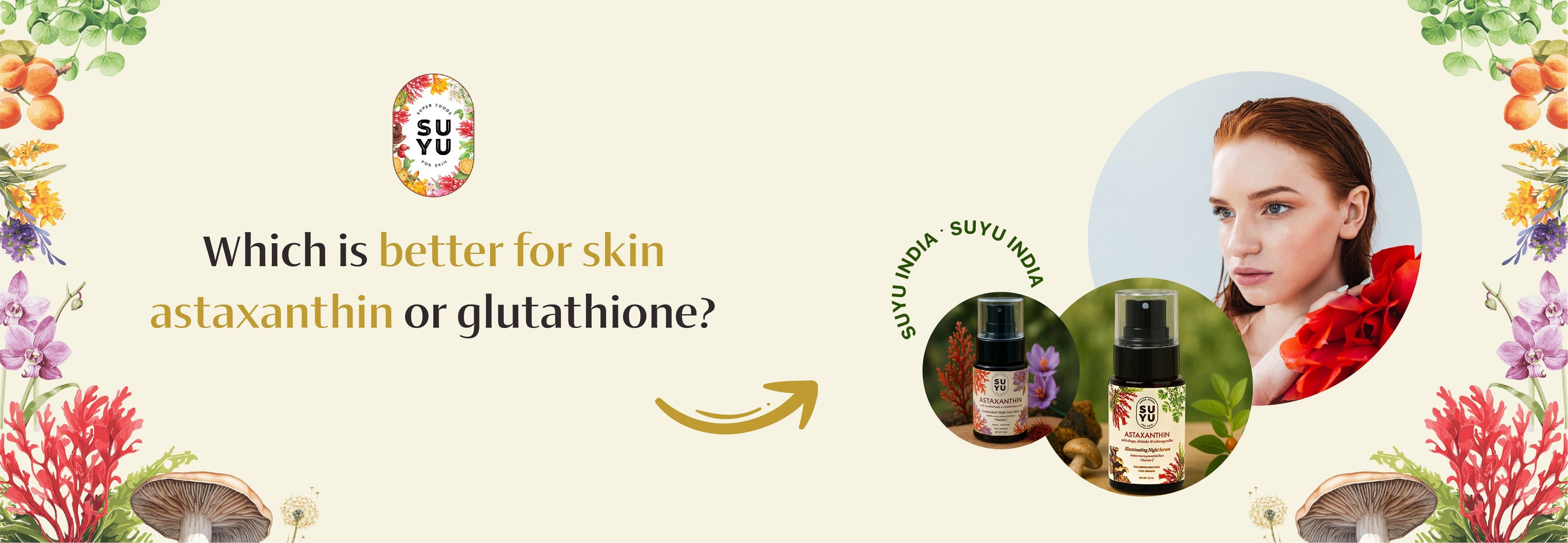
Which is Better for Skin: Astaxanthin or Glutathione?
Astaxanthin vs Glutathione: The Ultimate Skin Care Showdown
When it comes to achieving healthy, glowing skin, the world of skincare offers countless options. Two powerful antioxidants that have gained significant attention are astaxanthin and glutathione. Both promise remarkable benefits for skin health, but which one truly delivers better results? This comprehensive guide will help you understand the differences between skin astaxanthin and glutathione, their unique benefits, and how to make the right choice for your skincare routine.
What is Astaxanthin?
Astaxanthin is a naturally occurring carotenoid that gives marine life like salmon, shrimp, and krill their pink-red color. This powerful antioxidant is often called the "king of carotenoids" because of its exceptional ability to fight free radicals and protect cells from damage.
The Science Behind Astaxanthin
Astaxanthin belongs to a class of compounds called xanthophylls, which are known for their potent antioxidant properties. What makes astaxanthin unique is its molecular structure, which allows it to span cell membranes and provide protection both inside and outside the cell. This dual-action protection makes it incredibly effective for skin health.
Research shows that astaxanthin is up to 6000 times more powerful than vitamin C and 550 times stronger than vitamin E when it comes to antioxidant activity. This remarkable strength means that even small amounts can provide significant benefits for your skin.
Natural Sources of Astaxanthin
While astaxanthin is found in various marine organisms, the most concentrated sources include:
- Wild-caught salmon
- Krill
- Algae (particularly Haematococcus pluvialis)
- Shrimp and lobster
- Crab
For skincare purposes, astaxanthin is typically extracted from algae and incorporated into topical products or supplements.
What is Glutathione?
Glutathione is often referred to as the body's "master antioxidant" because it plays a crucial role in maintaining cellular health and protecting against oxidative stress. Unlike astaxanthin, glutathione is produced naturally by your body, specifically in the liver.
The Role of Glutathione in Your Body
Glutathione is a tripeptide composed of three amino acids: cysteine, glycine, and glutamic acid. It serves multiple functions in your body, including:
- Detoxifying harmful substances
- Supporting immune function
- Regenerating other antioxidants like vitamins C and E
- Maintaining cellular health
Why Glutathione Levels Decline
As we age, our body's natural production of glutathione decreases. Factors that can further reduce glutathione levels include:
- Chronic stress
- Poor diet
- Environmental toxins
- Excessive alcohol consumption
- Certain medications
- Lack of sleep
This decline in glutathione levels can contribute to various skin issues, including premature aging, dullness, and increased sensitivity to environmental damage.
How Astaxanthin Benefits Your Skin
Anti-Aging Properties
Astaxanthin's powerful antioxidant properties make it exceptionally effective at fighting signs of aging. Studies have shown that topical application of astaxanthin can:
- Reduce fine lines and wrinkles
- Improve skin elasticity
- Increase skin moisture levels
- Enhance overall skin texture
The Astaxanthin Firm & Lift Night Cream from Suyu India harnesses these anti-aging benefits to help you achieve firmer, more youthful-looking skin.
UV Protection
One of the most impressive benefits of astaxanthin for skin is its ability to provide natural UV protection. While it shouldn't replace your sunscreen, astaxanthin can help protect your skin from sun damage by:
- Reducing inflammation caused by UV exposure
- Preventing collagen breakdown
- Minimizing DNA damage from harmful rays
Improved Skin Hydration
Astaxanthin helps maintain optimal skin hydration by strengthening the skin barrier and reducing water loss. This results in plumper, more supple skin that looks healthy and radiant.
Reduced Inflammation
The anti-inflammatory properties of astaxanthin make it beneficial for people with sensitive or reactive skin. It can help calm irritation and reduce redness, making it suitable for various skin types.
How Glutathione Benefits Your Skin
Skin Brightening and Whitening
Glutathione is perhaps best known for its skin-brightening effects. It works by:
- Inhibiting tyrosinase, the enzyme responsible for melanin production
- Converting darker melanin (eumelanin) to lighter melanin (pheomelanin)
- Reducing the appearance of dark spots and hyperpigmentation
Detoxification
As your body's primary detoxification agent, glutathione helps remove toxins that can contribute to skin problems. When your body is better able to eliminate harmful substances, your skin often appears clearer and more radiant.
Collagen Protection
Glutathione helps protect and maintain collagen levels in your skin, which is essential for maintaining firmness and elasticity. This protection can help prevent sagging and the formation of wrinkles.
Acne Prevention
By supporting your body's natural detoxification processes and reducing inflammation, glutathione can help prevent and treat acne breakouts.
Comparing Astaxanthin and Glutathione for Skin Health
Mechanism of Action
Astaxanthin works primarily as a direct antioxidant, neutralizing free radicals before they can damage your skin cells. Its unique molecular structure allows it to provide comprehensive protection at the cellular level.
Glutathione functions as both a direct antioxidant and a supporting agent for other antioxidants. It helps regenerate vitamins C and E, extending their effectiveness in protecting your skin.
Effectiveness for Different Skin Concerns
For Anti-Aging:
Both astaxanthin and glutathione offer anti-aging benefits, but they work in different ways. Astaxanthin provides immediate protection against environmental damage, while glutathione supports long-term cellular health and repair.
For Skin Brightening:
Glutathione has a more pronounced effect on skin brightening and evening out skin tone. While astaxanthin can improve overall skin radiance, glutathione specifically targets melanin production.
For UV Protection:
Astaxanthin provides superior natural UV protection compared to glutathione, making it an excellent choice for people who spend time outdoors.
Absorption and Bioavailability
Astaxanthin is fat-soluble, which means it's best absorbed when taken with fats or applied topically in oil-based formulations. Products like the Astaxanthin Antioxidant Night Face Elixir are designed to maximize absorption.
Glutathione faces absorption challenges when taken orally, as it's often broken down in the digestive system. Topical applications and certain delivery methods can improve its effectiveness.
Which One Should You Choose?
The choice between astaxanthin and glutathione depends on your specific skin concerns and goals:
Choose Astaxanthin If:
- You're looking for powerful anti-aging benefits
- You want natural UV protection
- You have dry or dehydrated skin
- You're concerned about environmental damage
- You prefer oil-based skincare products
Choose Glutathione If:
- You want to brighten your skin tone
- You're dealing with hyperpigmentation
- You have acne-prone skin
- You're looking for detoxification benefits
- You want overall skin health improvement
Consider Both If:
- You want comprehensive skin protection
- You're dealing with multiple skin concerns
- You're serious about anti-aging
- You want to maximize antioxidant benefits
Best Ways to Use Astaxanthin for Skin Care
Topical Applications
Topical astaxanthin products are highly effective because they deliver the antioxidant directly to your skin. Suyu India's astaxanthin range offers several excellent options:
Morning Routine:
Start your day with the Astaxanthin Advanced Repair Day Serum followed by the Astaxanthin Advanced Repair Day Cream for comprehensive daytime protection.
Evening Routine:
For nighttime repair, use the Astaxanthin Illuminating Night Serum to brighten your complexion while you sleep.
Application Tips
- Apply astaxanthin products to clean, dry skin
- Use gentle, upward motions when applying
- Allow each product to fully absorb before applying the next
- Always follow with sunscreen during the day
Oral Supplements
While topical applications are highly effective, oral astaxanthin supplements can provide additional systemic benefits. The typical dosage ranges from 4-12mg per day, but consult with a healthcare provider for personalized recommendations.
Best Ways to Use Glutathione for Skin Care
Topical Products
Glutathione-containing skincare products can be effective, especially when formulated with ingredients that enhance absorption. Look for products that combine glutathione with vitamin C or alpha-lipoic acid for better results.
Oral Supplements
Glutathione supplements come in various forms:
- Reduced glutathione capsules
- Liposomal glutathione for better absorption
- Glutathione precursors like N-acetylcysteine (NAC)
IV Therapy
For those seeking maximum results, glutathione IV therapy provides direct delivery to the bloodstream, bypassing digestive issues. This method is particularly popular for skin brightening goals.
Lifestyle Support
You can naturally support your body's glutathione production by:
- Eating sulfur-rich foods (garlic, onions, cruciferous vegetables)
- Getting adequate sleep
- Managing stress levels
- Regular exercise
- Limiting alcohol consumption
Combining Both for Maximum Results
Using both astaxanthin and glutathione together can provide comprehensive skin benefits. This combination approach allows you to:
- Address multiple skin concerns simultaneously
- Maximize antioxidant protection
- Support both immediate and long-term skin health
- Create a more complete skincare routine
- How to Combine Them Safely
When using both ingredients:
- Start with lower concentrations and gradually increase
- Monitor your skin for any reactions
- Use astaxanthin primarily for external protection
- Use glutathione for internal support and brightening
- Maintain consistency in your routine
Real User Experiences and Scientific Studies
Clinical Research on Astaxanthin
Multiple studies have demonstrated astaxanthin's effectiveness for skin health:
- A 2012 study showed that 6mg of astaxanthin daily for 6 weeks improved skin elasticity and reduced wrinkles
- Research published in 2019 found that topical astaxanthin improved skin hydration and reduced inflammation
- A 2020 study demonstrated astaxanthin's ability to protect against UV-induced skin damage
Clinical Research on Glutathione
Scientific evidence supporting glutathione for skin includes:
- A 2017 study found that oral glutathione supplementation significantly improved skin brightness
- Research from 2016 showed that glutathione reduced melanin production in skin cells
- Multiple studies have confirmed glutathione's role in protecting against oxidative stress
User Testimonials
Many users of Suyu India's astaxanthin products report:
- Improved skin texture and radiance
- Reduced signs of aging
- Better skin hydration
- Enhanced overall skin health
Making the Right Choice for Your Skin
When deciding between astaxanthin and glutathione, consider:
Your Skin Type
- Dry skin: Astaxanthin's hydrating properties may be more beneficial
- Oily/acne-prone skin: Glutathione's detoxification benefits might be preferable
- Sensitive skin: Both can be beneficial, but start with lower concentrations
Your Primary Concerns
- Anti-aging: Both are effective, but astaxanthin provides more immediate protection
- Brightening: Glutathione is more specifically targeted for this goal
- Sun protection: Astaxanthin offers superior natural UV protection
Your Budget
Consider the cost of products and supplements when making your decision. High-quality astaxanthin products like those from Suyu India offer excellent value for their potency and effectiveness.
Professional Recommendations
Dermatologists often recommend:
- Starting with one ingredient to assess tolerance
- Using products consistently for at least 8-12 weeks to see results
- Combining topical applications with oral supplements for maximum benefits
- Maintaining realistic expectations about results
Conclusion
Both astaxanthin and glutathione offer remarkable benefits for skin health, but they work in different ways and excel in different areas. Astaxanthin provides powerful protection against environmental damage and excels in anti-aging applications, while glutathione offers superior skin brightening and detoxification benefits.
The best choice depends on your individual skin concerns, goals, and preferences. For comprehensive skin health, many people find that using both ingredients provides the most complete protection and improvement.
Whether you choose astaxanthin, glutathione, or both, consistency is key to achieving the best results. High-quality products like those in Suyu India's astaxanthin range can help you achieve your skin health goals effectively and safely.
Remember to consult with a dermatologist or healthcare provider before starting any new skincare regimen, especially if you have sensitive skin or existing skin conditions. With the right approach, either astaxanthin or glutathione can help you achieve the healthy, radiant skin you desire.
Ready to transform your skin? Explore Suyu India's complete astaxanthin collection and discover the power of this remarkable antioxidant for yourself.



